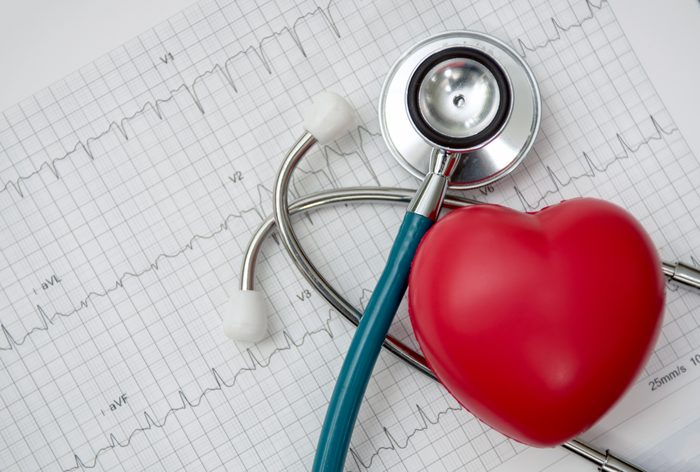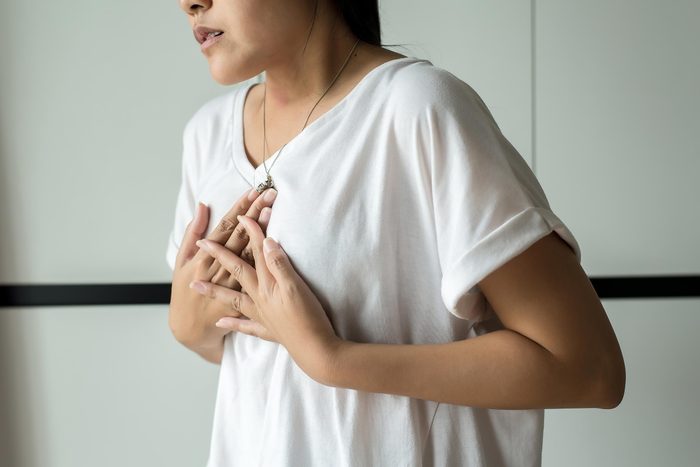
When your heart “skips a beat” it may feel like a brief flutter or flip-flop in your chest. A scary symptom that is usually harmless, that skipped beat feeling is actually an extra beat that is medically defined as a premature beat. There are two types of premature beats, a premature atrial contraction in the top chamber of the heart and a premature ventricular contraction from the lower heart chamber, which pumps the blood to other parts of your body, according to the American Heart Association.
Premature beats occur when electrical impulses from your heart misfire—earlier than expected, usually. The good news is that most premature beats don’t necessarily mean there’s something wrong with your heart’s structure. But if they do become frequent or are accompanied with shortness of breath or chest pain (typical signs of a heart murmur), visit your doctor to make sure it’s nothing serious. “Neither of these are considered dangerous. Although there are exceptions, these signs are typically benign,” says Ayman A. Hussein, MD, a cardiac electrophysiology specialist at the Cleveland Clinic in Ohio. “It comes down to symptoms and quality of life.” (Check out how heart doctors protect hearts.)

Too much coffee
That cup of coffee does more than just give your senses a jolt in the morning—it gives your heart one too. Caffeine stimulates the stress hormones, such as adrenaline, to rapidly pump through your body, which exacerbates abnormal heart rhythms, like when your heart skips a beat. “It’s not that caffeine is causing it to skip, [caffeine] is just making it more obvious, more prevalent, and making it show up and cause symptoms,” says Dr. Hussein. Try cutting back on your intake by drinking decaf after your first to see if that helps regulate your heartbeat. Or try switching to tea vs. coffee and see if that makes a difference.

Stress
Stress is never good for your health, especially when it comes to the heart. When you’re stressed, your brain activates its fight-or-flight response thanks to a surge of adrenaline; this helps your body react quickly to the stressor. In response to this sudden increase in stress hormones, like cortisol, your heart skips a beat because it’s working harder to increase the blood supply to your muscles, heart, and other vital organs. Even getting spooked by a friend can get that adrenaline coursing through your veins, which may make you feel a sudden pause in your chest. “Stress isn’t creating the problem, it’s making the problem more prominent,” says Dr. Hussein. “Stress hormones are known to correlate with these types of extra beats.”

Too much alcohol
Alcohol is known to send your heart’s electrical rhythm on the fritz and raise the adrenaline in your blood, says Dr. Hussein. The rise in these stress hormones, in turn, increases the free fatty acids in your blood, which are known to contribute to irregular heart rhythms. and adrenaline in your blood, which may cause a premature beat. Typically, these symptoms only last for a few seconds or disappear within 24 hours as the alcohol leaves your body.
But you should see a doctor if these premature beats are frequent. Drinking heavily can trigger atrial fibrillation (AF), an irregular heartbeat disorder that can lead to stroke, heart failure, or a heart attack if it’s not diagnosed and treated properly, reports the American Heart Association. Moderation is key so limit yourself to only a few glasses each week instead of slugging back three glasses a day. (Need help? Check out these 17 simple tips for drinking less.)

Lack of sleep
A sleepless night leaves both you and your heart feeling tired and miserable the next day. “When you don’t get good quality sleep you feel irritated,” says Dr. Hussein. “The body tries to react to the lack of sleep by increasing certain hormones to deal with the stress. The stress hormones can trigger those extra beats.” For a quick fix, make sure you get the recommended seven to eight hours of sleep every night. Writing away your worries and skipping the alcohol-induced nightcap are just a couple ways you can help give your body a full night’s rest.

Fluctuating hormones
Pregnancy, menopause, and thyroid issues can all create a lot of changes in the body because your hormones are out of whack. Possibly your heart skips a beat here and there as an increase in blood volume pumps through an expectant mother’s body or when your hormones are on a roller coaster ride during menopause. An overactive or underactive thyroid can also throw your hormones into a tailspin.
“It’s not dangerous, but it’s annoying,” says Suzanne R. Steinbaum, DO, cardiologist and spokesperson for the American Heart Association’s Go Red For Women movement. “It’s all about pressure on the heart.”
Fluctuating hormones, such as a hyperactive thyroid, amps up your heart rate, and a dip in estrogen from menopause stiffens up your blood vessels and heart muscle, all of which place an extra strain on your heart, she says, Some moms-to-be may even develop pregnancy-related cardiomyopathy, a condition where the heart weakens and causes skipped beats. For those instances, a doctor uses an echocardiogram (an ultrasound of the heart) to determine if it’s benign or a structural problem.

Your exercise regimen
The harder you pound the pavement during your evening run, the higher your heart rate and blood pressure will go. And thus, your heart might skip a beat. People with genetic heart abnormalities must take precautions when exercising, especially if they are predisposed to premature beats at a rapid rate from both chambers of the heart. Overexertion and an abnormal heart do not mix and may put your health at risk. “You read reports about people dropping dead during marathons. That’s a ventricular arrhythmia from the bottom of the heart,” says James T. Willerson, MD, president emeritus at the Texas Heart Institute in Houston. “[They] exercise above a level that their heart could tolerate, especially if one is older or has underlying heart disease. It would not allow one to have a rapid heart rate for a sustained period of time.”

A mineral deficiency
Low levels of essential minerals, such as potassium and magnesium, may impact your heart health. Potassium helps keep all your bodily functions in check by acting as an electrolyte to keep your cells, tissues, organs, and heart’s electrical system in working order, says Dr. Willerson. Magnesium helps protect your heart from heart attack risks, strengthens muscles and tissues, and lowers your blood pressure. If you notice your heart skips a beat, your doctor may want to test your mineral levels. “We try to correct what we believe to be the responsible mechanism,” he says. “Even if it’s low potassium, we have to give them medication.”

Dehydration
Getting enough water throughout the day keeps your heart beating at a healthy pace. Neglecting to replenish your body with fluids could cause your sodium and potassium levels to drop, which throws your electrolyte balance out of whack, notes Dr. Willerson. Without a sufficient supply of electrolytes, your heart’s electrical signals could go haywire and cause your heart to skip a beat, according to experts at Yale Medicine. Bananas are an easy potassium-rich food to add to your diet that can help keep dehydration at bay. (Sugar cravings and mood swings are just a couple other dehydration signs.)

An underlying heart condition
Although most extra beats are harmless and easily fixed, beware of premature beats that occur frequently, double up, or beat three times in a row at a fast rhythm—these patterns can signal a hidden health problem and pose an extra danger to your health, such as high blood pressure, heart disease, and atrial fibrillation. “Most of the time premature beats are benign, but we don’t want to miss those patients who have a structural problem of the heart or multiple extra beats from other areas of the heart,” says Dr. Hussein. “Everyone needs to be assessed by a healthcare specialist.”
When your heart skips a beat, that’s not the only sign of heart trouble. Watch out for these other signs of an unhealthy heart.
